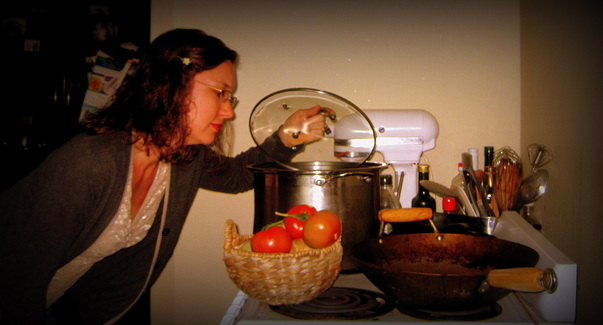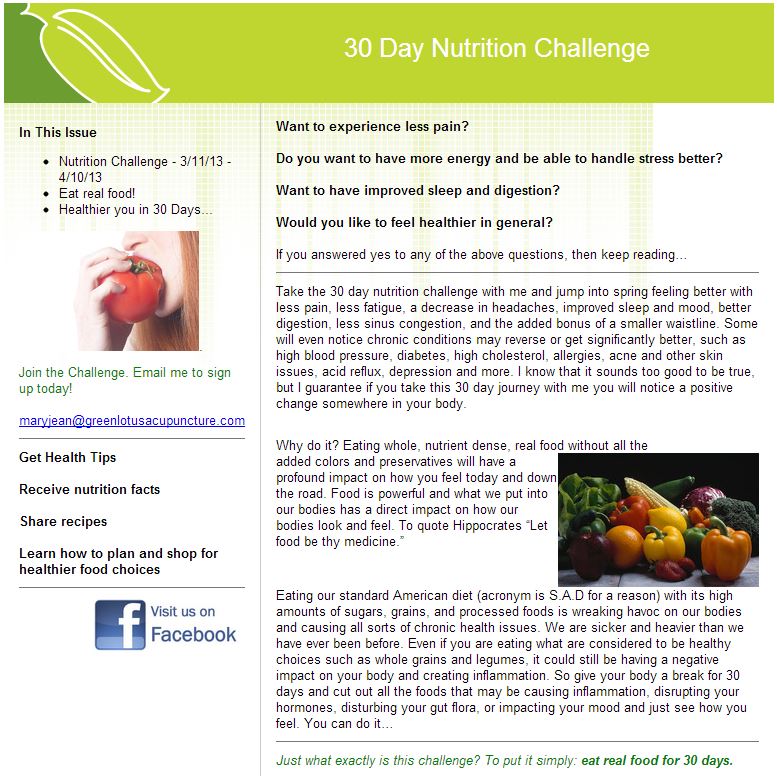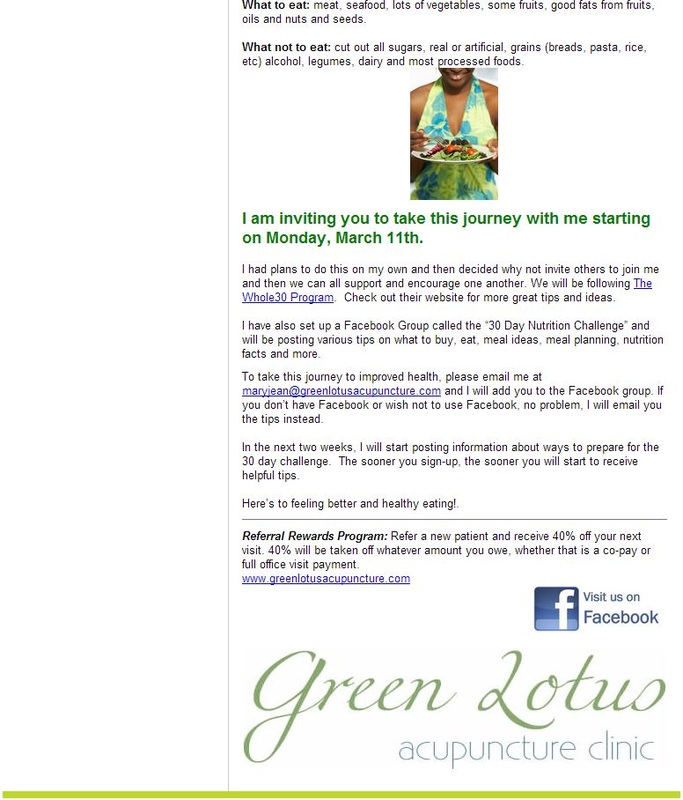 cook smarter, stress less ...you gotta eat, so why not upgrade your kitchen time? do you... ...struggle with trying to cook homemade food without spending all your time in the kitchen? ...stare into your fridge for long minutes, with only mustard and bare shelves staring back at you? ...want to eat healthier lunches at work, but never cook ahead of time, so you end up eating out more often than you'd like to admit? (warning sign #1: the fast food clerk knows your name and order) if so, then join Dr. Angela on this free 3 day workshop and find out how to... ...structure your kitchen time for minimal prep and maximal meal production ...eat better, cook smarter and stress less over your food choices ...learn how to keep your fridge stocked with healthy meals and snacks ...and get a few bonus recipes to help you get started, now! join me from the comfort of your pjs Register for the workshop now (it takes 2 seconds), then sit back and follow along as the entire course is sent to your inbox through my short course on upping your kitchen game. Each day will bring a new e-booklet to your inbox, so you can read and follow along at any time. so what's the cost? For all this love, time, and organization, I'm bring you Let's Get Cooking for free ...but only if you sign up now through June 9th alright, so when do we start? Let's Get Cooking runs Monday June 10th to Wednesday June 12th. Sign up today to save your spot. If you have a friend who also needs some kitchen intervention, pass this link along and Get Cooking together!
1 Comment
Starting in one week is the 30 Day Nutrition Challenge. Organized by Mary Jean Brinkman, acupuncturist and fellow Apex Wellness Center practitioner. March is a great time for evaluation, adjusting or otherwise tweaking your approach to food and exercise. This specific challenge is based on the Whole30 Program, as described below. Email Mary Jean to join the challenge and receive resources and support during the challenge.
Success is far more assured when the challenges and triumphs are shared with others. Don't wait, sign up is only open for another week. Email me or comment below if you would like access to any additional related links or resources or to be added to Mary Jean's contact list for future events and information. As always, to your good health! Ninety percent (90%!) of cancers have preventable causes. Here's a quick "What are my chances of getting cancer" quiz. Count up your points for these health factors. Do you: Exercise? Yes= 0 Sometimes=1 Never=2 Smoke? No=0 Used to=1 Yes=2 Drink alcohol? No=0 More than 2 a day=2 Get checked for STIs? Yes I have=0 No or "What is that?" =1 Eat fast food? No=0 Occasionally=1 Daily=2 Have exposure to any of these known carcinogens (means cancer-causers). One point for each: radiation exposure (occupational or many, many X-rays), polluted water, chemical or industrial toxin exposure (such as from your occupation or living nearby a chemical plant) and a history of bad (blistering) sunburns. Now, if you didn't notice the pattern above, this is not the SATs. More points is not better- it's worse off for your cancer risk. And since 95-98% of all cancers are not genetic (inherited and perhaps inevitable), then that means there's ample time and resources for cancer prevention. Take a look at this engaging infographic from Rock Your Cause and see your nearest preventive medicine doc and cultivate your health for now and decades to come. Contact me for more, or feel free to email me day or night at [email protected]. Be healthy, well and happy. And remember, "prevention is the best cure."
So how nutritious is your food? How much calcium, vitamins and iron do you really get out of your food? And how's a person supposed to know? Well, if you look to the CDC's recent release of their seven-year long project, the National Health and Nutrition Examination Survey, then there's not much to worry about. On average, only 1 to 10% of those tested were nutritionally deficient in any given vitamin or mineral. But how can you know? How do you know if you get enough folate or omega-3 fatty acids? And how much does your food contain, anyways? Do we need vitamin and mineral supplements? To summarize my answer to these and many more questions, please take a few minutes and view this highly informative, engaging and inspirational video by Dr. Terry Walhs MD. Since whole organic fruits and vegetables are where it's at, recently I was inspired to create a lunch that Dr. Walhs would approve of. Seen below, it's a garden salad and sauteed vegetables, complete with many colors and sulfur-containing foods. So if you don't get enough nutrients from your food alone, how can you tell? In developing countries and areas where access to food is limited, the types of malnutrition seen there (e.g. poor development, brittle hair and teeth) is much more severe than the insidious type seen in America: overweight and overfed but nutritionally poor diet. I would call this nutritional insufficiency. What can that look like? Some one lacking in one or more of our basic vitamins and minerals may experience headaches, poor concentration, low stamina, poor wound healing, many different skin complaints, tension, nervousness, depression and/or low energy. Might you know any one with one or more of these complaints?
Let me know any specifics I can answer on the above raised topics or feel free to write below any responses this topic raises. I am eager to answer readers' questions, but as always, the material here is no substitute for careful and conscientious medical advice. Naturopathic physicians are experts at dietary analysis and can identify unique nutritional deficiencies or insufficiencies you may have. This is after taking into consideration any one of a number of common complaints which are seen as "normal" but may in fact be easily treated with a few simple dietary changes. Please check in with your local ND for concerns specific to your situation. Has science left common sense eating in the dust? When I see Cherry 7-Up Antioxidant advertising "A Delicious Cherry Way to Pick Your Antioxidant.," it seems that science, any science whatsoever, trumps common sense. When you have no idea how your food is made, as is the case with pretty much all processed food, you leave your health in the hands of companies such as Pepsi-Co. Personally, I do not trust that these companies have my health in mind when they're advertising the antioxidant power of soda pop. So, if Pepsi-Co won't look out for our best health, who will? You will. And if the old adage is right, that we are what we eat, then what should we eat? Well, I for one was not created in a lab, so why would lab-created food be best for me? It wouldn't. What is "whole food?" I like to think of it as food you can identify. Meat, vegetables, fruit. What isn't whole food? Food that you have no idea how it was created. If you're squinting to make out the ingredient names (if you're looking at the ingredients list at all), you're probably not eating whole food. And if you're not eating whole food, then you're eating part food and part chemicals, at a greater cost. A whole chicken and rice (or beans or potatoes) will always cost a family less than Combo/Value/Kid's Meals for everyone at a fast food establishment. And what kind of sense does that make? If you want to read more on this, one place to look is Michael Pollan. I've taken the liberty to condense his already condensed "7 Rules for Eating" to the phrase: "Real Food, Not too Much, Not too Fast." See WebMd's page on him as a springboard into this topic.
Thank you for reading. I always appreciate your comments and questions! Latest research looking into three studies found that there was a positive link between pesticide exposure while in utero and lower IQ scores when tested in childhood (last week's USA Today article here). Those pesticides which correlated with lower IQ scores are currently sprayed on our nation's non-organic fruits and vegetables. The research authors' solution? Wash your produce well. Well, how does one completely remove all pesticide residue from conventionally grown produce? Does any kitchen soap get rid of all the chemicals which have been sprayed on then soaked up by a fruit or vegetable? And would you even want scrub down all your fruits with Dawn? Organic produce is guaranteed to come pesticide-free, as well as being free of fungicides, vermicides, GMO and a whole host of other unnatural chemicals which are applied directly to our food and wash into the water supply. So, one may conclude that organic produce may just be a really smart thing for pregnant mothers to eat, though there's no need to stop eating organic when the baby comes! Thanks you for reading. I appreciate the support, comments and questions I've received thus far.
-Angela |
Archives
June 2024
Categories
All
|
about the doc |
patient infocontact |
|
Privacy Policy
© Copyright 2011-2024, Dr. Angela Cortal ND LLC website content is for educational purposes only and is no substitute for medical advice (see the Terms of Use Agreement for this site), you must establish a doctor-patient relationship to receive that! |





